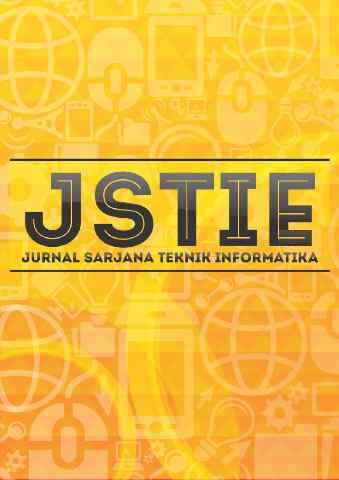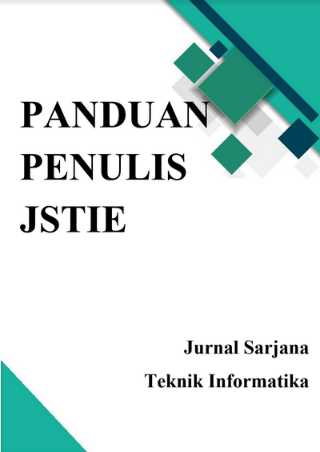Perancangan Arsitektur Game Virtual Academic
DOI:
https://doi.org/10.12928/jstie.v10i1.21077Keywords:
Arsitektur Game, Portal Akademik, RPG, TCSD, Game VAAbstract
Game Virtual Academic (VA) berbasis mobile dapat membantu dalam memantau perkembangan akademik mahasiswa. Pada saat ini, portal akademik mahasiswa Universitas Ahmad Dahlan hanya menyajikan data berupa teks sehingga mahasiswa jarang membuka portal dan belum ada fitur untuk mengetahui skill dalam bidang akademik. Metode penelitian yang digunakan adalah Task Centered System Design (TCSD) terdiri dari tahapan analisis, perancangan, construction, pengujian. Dari penelitian ini didapatkan hasil berupa Arsitektur Game VA dengan fungsi yang telah 100% sesuai dengan task requirements yang dibutuhkan oleh sistem. Rata-rata pengujian didapatkan nilai 8.0 sehingga Arsitektur Game VA yang dikembangkan dapat dikatakan acceptable.
References
S. N. Wahyuni and C. Andiyoko, “Pembuatan Game Berbasis Pembelajaran Menggunakan RPG Marker MV,” J. Comput. Networks, Archit. High Perform. Comput., vol. 1, no. 1, pp. 24–28, Dec. 2018, doi: 10.47709/cnapc.v1i1.5.
S. N. Wahyuni and C. Andiyoko, “Pembuatan Game Berbasis Pembelajaran Menggunakan RPG Maker MV,” J. Mantik Penusa, vol. 2, no. 2, pp. 29–33, 2018.
F. T. Romadhona and E. Yundra, “Pengembangan Edugame sebagai Media Pembelajaran Berbasis Role Play Game (RPG) pada Mata Pelajaran Simulasi Digital Kelas X TAV di SMKN 3 Surabaya,” J. Pendidik. Tek. Elektro, vol. 7, no. 2, pp. 101–107, 2018.
C. N. Aulina, “Pengaruh Bermain Peran Terhadap Peningkatan Kemampuan Sosial Anak Usia Dini,” J. PG-PAUD Trunojoyo, vol. 1, no. 1, pp. 14–27, 2014, doi: https://doi.org/10.21107/ pgpaudtrunojoyo.v1i1.3474.
David, “Perancangan Game Mobile Android Bergenre Horror,” CogITo Smart J., vol. 2, no. 2, p. 167, 2016, doi: 10.31154/cogito.v2i2.27.167-179.
I. M. Safitri, “Perancangan Game ‘ Myroom ’ Untuk Mempermudah Dalam Menata Kamar Menggunakan Markerless Augmented Reality,” Universitas Islam Negeri Syarif Hidayatullah, 2019.
M. A. Nurdin and I. Hermawan, “Analisis Dan Pengembangan Aplikasi Inhouse Klinik Perusahaan Menggunakan Framework Codeigniter, Studi Kasus Pt Reckitt Benckiser Indonesia,” J. Teknol. Terpadu, vol. 3, no. 1, pp. 1–7, 2017.
Sugiyono, Metode Penelitian Kuantitatif, Kualitatif, dan R & D. Bandung, Indonesia: Alfabeta, 2019.
D. A. Trisliatanto, Metodologi Penelitian, 1st Editio. Yogyakarta, Indonesia: Andi Offset, 2020.
D. Yulianto, R. Hartanto, and P. I. Santosa, “Evaluation on Augmented-Reality-Based Interactive Book Using System Usability Scale and User Experience Questionnaire,” J. RESTI (Rekayasa Sist. dan Teknol. Informasi), vol. 4, no. 3, pp. 482–488, Jun. 2020, doi: 10.29207/resti.v4i3.1870.
Downloads
Published
Issue
Section
License
License and Copyright Agreement
In submitting the manuscript to the journal, the authors certify that:
- They are authorized by their co-authors to enter into these arrangements.
- The work described has not been formally published before, except in the form of an abstract or as part of a published lecture, review, thesis, or overlay journal. Please also carefully read Journal Posting Your Article Policy.
- The work is not under consideration for publication elsewhere.
- The work has been approved by all the author(s) and by the responsible authorities – tacitly or explicitly – of the institutes where the work has been carried out.
- They secure the right to reproduce any material that has already been published or copyrighted elsewhere.
- They agree to the following license and copyright agreement.
Copyright
Authors who publish with Jurnal Sarjana Teknik Informatika agree to the following terms:
- Authors retain copyright and grant the journal right of first publication with the work simultaneously licensed under a Creative Commons Attribution License (CC BY-SA 4.0) that allows others to share the work with an acknowledgement of the work's authorship and initial publication in this journal.
- Authors are able to enter into separate, additional contractual arrangements for the non-exclusive distribution of the journal's published version of the work (e.g., post it to an institutional repository or publish it in a book), with an acknowledgement of its initial publication in this journal.
- Authors are permitted and encouraged to post their work online (e.g., in institutional repositories or on their website) prior to and during the submission process, as it can lead to productive exchanges, as well as earlier and greater citation of published work.








